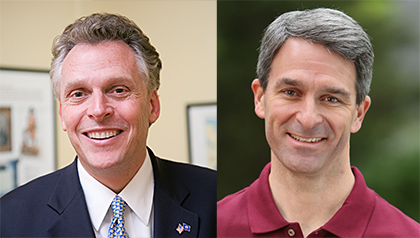AARP Hearing Center

By Tamara Lytle • Virginia voters get a choice this year between gubernatorial candidates with strongly divergent views on issues important to older Americans.
Republican Ken Cuccinelli and Democrat Terry McAuliffe are competing in the Nov. 5 election, one of only two gubernatorial races in the country this year.
The victor will influence how the state implements the new national health care reform law. The two candidates could scarcely have more different approaches.
Under the federal Affordable Care Act, states can choose whether to expand Medicaid to people younger than 65 if their incomes are less than about $15,900 for a one-person household or about $21,400 for a two-person household. In Virginia, about 62,000 people ages 50 to 64 would qualify.
Washington has promised to pay the full fare of new enrollees for the first three years; states would then begin paying a share of the coverage, to a maximum of 10 percent.
Medicaid expansion
“I will not sign a budget in Virginia unless it includes the Medicaid expansion,” McAuliffe said.
He said the expansion, in addition to providing access to health care, makes economic sense because the federal government’s coverage for the first three years would bring billions into the state’s economy and create 30,000 jobs.
Cuccinelli said he’s “not supportive of Medicaid expansion. It’s not a ‘no never.’ It’s a ‘no, not now.’ I want to see a lot more flexibility in our ability in Virginia to conduct our own reforms” within Medicaid.
He said he’s worried the federal government would renege and leave Virginia to pay the costs.
Both candidates said they’d like to help older Virginians stay in their homes instead of having to move to nursing facilities.
An AARP survey found 84 percent of those 50 and older would rather age in their homes. But 55 percent of the Medicaid money Virginia spends on long-term care is spent on institutional care, with 45 percent devoted to community-based care.
Cuccinelli vowed to audit all Medicaid home-care providers to drive shady operators out of business.
Too many are “fly by night” and leave older people without the care they need, he said. “We can provide more, better care with this money if we are policing it more carefully.”
McAuliffe said he would work with Area Agencies on Aging to ensure they have sufficient resources to help people remain in their homes and delay a move to a nursing facility. “We’ve got to do it in a manner seniors are taken care of.”
Economic, tax policies
The two also differ on how to spur the economy and make sure there are jobs for older workers hard hit by the recent recession.
Cuccinelli said he wants to tailor job training for older people to align with the types of industries that have job openings.
His plan to spur the economy includes dropping the state’s top income tax rate from 5.75 percent to 5 percent and cutting business income tax rates from 6 percent to 4 percent. Getting rid of exemptions (except health and education exemptions) and loopholes in the tax code would help pay for the cuts, he said.
McAuliffe said Virginia’s tax rates already are low. What the state needs, he said, is better transportation infrastructure so companies can transport goods quickly and workers don’t waste time in traffic gridlock.
He said he would like to make Virginia the Silicon Valley of the growing cybersecurity field.
“Somebody is going to be the leader in the world. I want Virginia to be the leader,” McAuliffe said.
Cuccinelli, 45,was a business law attorney before becoming a state senator. He was elected state attorney general in 2009.
McAuliffe, 56, has a law degree and is an entrepreneur. He is a former chairman of the Democratic National Committee.
See a voters’ guide at aarp.org/va.
Tamara Lytle is a writer living in Falls Church, Va.































































